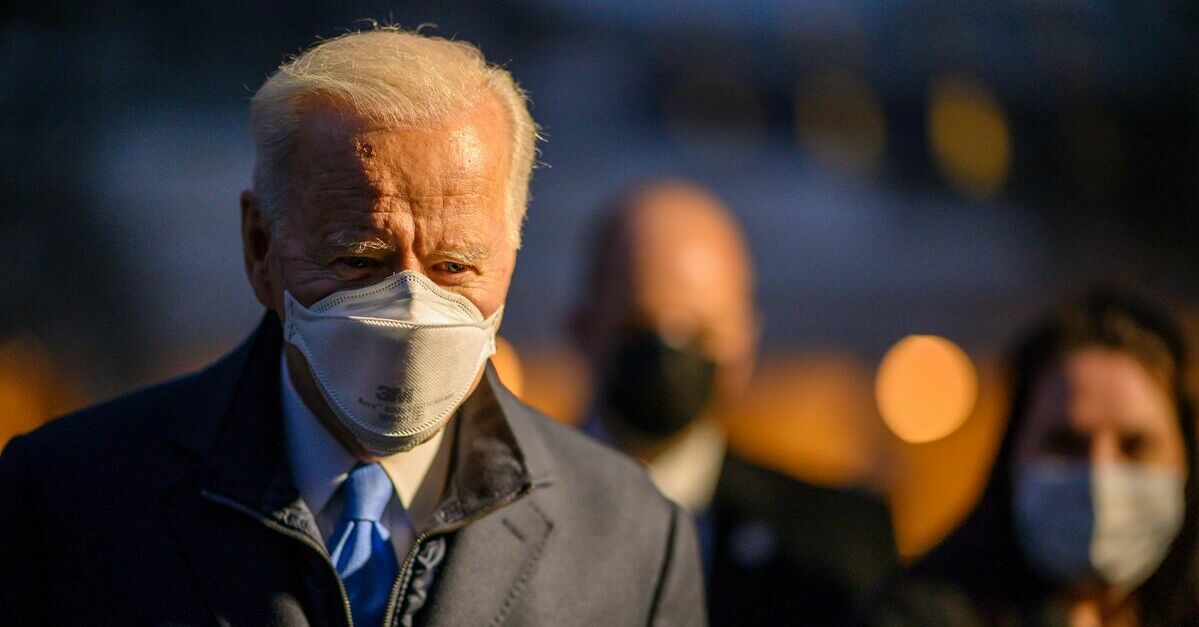
US President Joe Biden leaves the White House to spend the weekend in Camp David, on February 12, 2021 in Washington, D.C.
A coalition of marijuana business advocates, public policy groups and criminal justice reformers is calling on President Joe Biden to issue grants of clemency to people convicted under federal drug laws.
“Thank you for taking a strong leadership position in support of criminal justice reform in the United States,” the Presidents Day open letter sent by the National Organization for the Reform of Marijuana Laws (NORML) and various stakeholder organizations begins. “The protests and civil unrest that dominated the news following the murder of George Floyd revealed historic levels of mistrust and eagerness for bold new leadership. Our system is in urgent need of reform, and we appreciate the goals outlined by your administration.”
The message is framed as a challenge for Biden to follow-through on a campaign promise to expunge the criminal records of people who were convicted of non-violent marijuana offenses.
During a Democratic Party primary debate in November 2019, Biden said: “I think we should decriminalize marijuana, period. And I think everyone – anyone who has a record – should be let out of jail, their records expunged, be completely zeroed out.”
Now that Biden is in a position to do exactly that, NORML and others are hoping to hold him to those words and are asking him to issue “a categorical pardon grant.”
From the letter:
President Biden, we urge you to clearly demonstrate your commitment to criminal justice reform by immediately issuing a general pardon to all former federal, non-violent cannabis offenders in the U.S. In addition, all those who are federally incarcerated on non-violent, cannabis-only offenses for activity now legal under state laws should be pardoned and their related sentences commuted.
“Cannabis prohibition ruins lives, wastes resources, and is opposed by a large majority of Americans,” the letter goes on. “Two out of every three states in the U.S. have abandoned the federal government’s blanket prohibition and now provide safe and regulated access to cannabis for adults and/or those with qualifying medical conditions. And Illinois Gov. J.B. Pritzker has showcased the important role of clemency in achieving justice and equity with cannabis reforms through his recent work pardoning or expunging nearly half a million prior cannabis convictions.”
The letter says that despite the ongoing movement to reform the nation’s drug laws viz. marijuana, the sting of criminalization is still a major detriment to victims of the failed War on Drugs.
“Convictions can seriously limit job opportunities, housing, and educational options,” the NORML letter notes. “Long after a person has gone through the legal system, the baggage of the war on marijuana continues to undermine that person’s life and diminish their prospects. It is past time for the harm to stop.”
The coalition says that categorical pardon grants are “hardly unprecedented.”
Again the letter:
Presidents from both political parties have taken such action when circumstances warranted it. In 1974, President Ford signed a proclamation granting conditional pardons to the Selective Service Act violators who did not leave the United States. In 1977, President Carter issued categorical pardons to all Selective Service Act violators as a way to put the war and divisions it caused in the past.While the war on cannabis impacts individuals of all races, a disproportionate number who enter the criminal justice system are people of color.
NORML sent the letter in conjunction with Project Mission Green/The Weldon Project, REFORM Alliance, Council on Criminal Justice, Taking Action for Good, The Last Mile, CAN-DO Foundation, Libertas Institute, Buried Alive Project, Minority Cannabis Business Association, United States Cannabis Coalition, and the National Cannabis Industry Association.
Once famously described as “ethnic cleansing American style,” the bipartisan War on Drugs is viewed as a racist policy by critics due to the disproportionate impact that policing and enforcement has had on Black communities in particular. Other minority groups are also disproportionately affected by the criminalization of drugs in the United States. But studies have consistently shown that white people and communities of color use drugs at effectively the same rates.
According to the Hamilton Project, “Black and white Americans sell and use drugs at similar rates, but black Americans are 2.7 times as likely to be arrested for drug-related offenses.”
The coalition letter takes note of the racial justice component in granting blanket pardons as well.
“Today, the long-term harm of cannabis prohibition in communities of color throughout the country is profound,” the document continues. “As we look to solutions to provide healing, the dangerous policing tactics that were developed to execute the war on marijuana, including no-knock warrants and other aggressive tactics, shock the nation and have led us to historic levels of mistrust. When a large majority of Americans no longer believe cannabis should be illegal, aggressive enforcement tactics quickly lose support. A general pardon of all former and current federal non-violent cannabis offenders would be the kind of grand, ambitious, and impactful action that would effectively signal to marginalized communities that their suffering is seen and that the government seeks to remedy their harms.”
“President Biden was crystal clear on the campaign trail that his administration would prioritize criminal justice reform, and he explicitly highlighted his desire to expunge the records of those suffering from the stigma of a federal marijuana conviction,” NORML Executive Director Erik Altieri said in a press release. “Following through on this campaign promise would be an important first step in remedying the past wrongs associated with nearly a century of marijuana prohibition and healing the wounds of the many Americans who have needlessly suffered under this failed public policy. In 2021, it is readily apparent that the criminalization of cannabis, and the lifelong lost opportunities that come with a criminal marijuana conviction, causes far greater harm than the responsible use of cannabis itself.”
[image via ERIC BARADAT/AFP via Getty Images]
Have a tip we should know? [email protected]